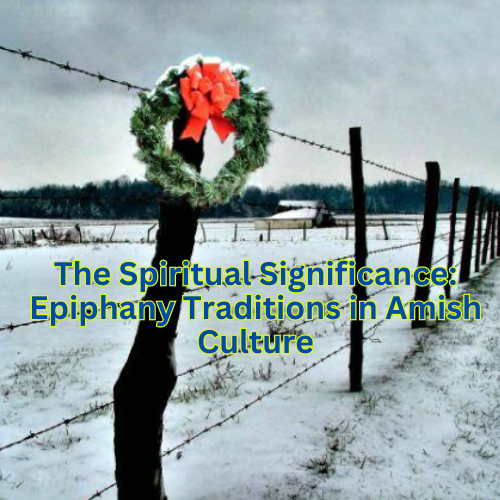Amish Epiphany
The Amish, known for their commitment to simplicity, community, and tradition, celebrate Epiphany with reverence and familial closeness. Epiphany, also called Three Kings’ Day or Twelfth Night, marks the culmination of the Christmas season and commemorates the visit of the Magi to the infant Jesus.
The Amish Epiphany celebration, much like their daily lives, revolves around faith, family, and community. Though the specifics of their observance may vary among different Amish communities and individual families, several key elements are typically part of their Epiphany traditions.
Spiritual Reflection and Worship:
Epiphany for the Amish is a time of spiritual reflection and devotion. Families gather for special church services where hymns are sung, prayers are offered, and sermons focus on the significance of the Magi’s visit and the manifestation of Christ’s divinity. These services are conducted in their simple meetinghouses, emphasizing the Amish commitment to humility and community fellowship.
Family Gatherings and Fellowship:
After the church service, families come together for intimate gatherings. These gatherings often involve a communal meal, where traditional Amish dishes take center stage. The atmosphere is warm, and stories are shared, fostering a sense of togetherness and reinforcing familial bonds.

Gift-Giving and Acts of Kindness:
In some Amish communities, Epiphany involves small-scale gift-giving among family members and close friends. Gifts are usually practical or handmade, aligning with the Amish value of simplicity. Additionally, there’s a strong emphasis on acts of kindness and charity during this time, reflecting the spirit of giving and sharing.
Symbolism and Traditions:
Symbolism plays a significant role in Amish celebrations, and Epiphany is no exception. Some families may incorporate symbolic elements into their observance, such as displaying the three wise men in nativity scenes or creating handmade decorations that represent the guiding star. These symbols serve as reminders of the religious significance of the day.
Continuation of Christmas Traditions:
For the Amish, Epiphany is an extension of the Christmas season rather than a distinct event. Many Christmas traditions, such as singing carols, decorating the home with candles and greenery, and storytelling, continue during this time, creating a seamless transition from Christmas to Epiphany.
Quiet Reflection and Gratitude:

Beyond the festivities, Epiphany is a time for quiet reflection, gratitude, and introspection. The Amish take moments during this day to reflect on the blessings received throughout the past year and to express gratitude for their faith, family, and community.
In essence, the Amish celebration of Epiphany embodies their core values of faith, family, simplicity, and community. It serves as a moment of spiritual significance, reinforcing their commitment to a life centered on faith and humility while fostering connections among loved ones. The traditions and observances during this time emphasize the timeless values that define the Amish way of life.

